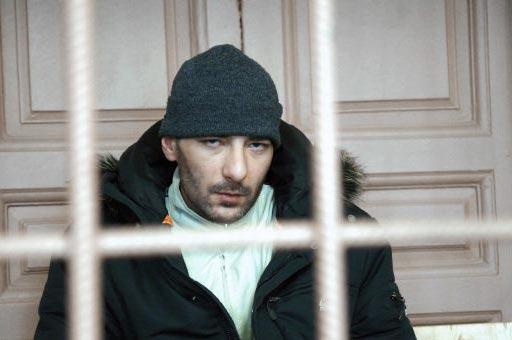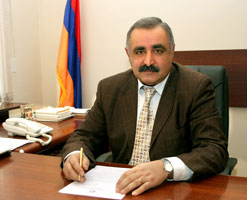Aleksanyan rose within Yukos Oil to become executive vice president, a position he held for exactly two days before he was arrested on April 6, 2006 and accused of being an accomplice to tax evasion and money laundering. Never put on trial and suffering from AIDS-related illnesses, he was released from prison in 2009 and died at age 39 in 2011. Mikaelyan fled to the United States as a fugitive rather than face criminal charges in Armenia for his work on behalf of Yukos CIS Investment. Vasily Aleksanyan
Vasily Aleksanyan
This relationship between former classmates has had major repercussions for both Mikaelyan, the Armenian justice system and even the relationships between neighboring states. The result has been an ongoing court struggle across a number of countries as the Russian government fights to seize the last of the Yukos Oil money. And one Armenian judge said he was pressured by his superiors in the Armenian government, a pro-Russian leaning state, to rule in favor of the Russian giant.
The stakes are huge. A former employee of the Armenian company told OCCRP partner hetq.am that Yukos CIS Investment-related companies held assets of at least $4 billion – money that Russian energy giant Rosneft, which now owns Yukos, has been trying to seize.
The Battle Begins
The maneuvers in Armenia are part of a wider battle stretching back to 2003, when Yukos Oil was hit with a US$ 30 billion Russian tax bill and eventually forced into bankruptcy in 2006. Former Yukos Oil chief executive officer Mikhail Khodorkovsky, whose political ambitions drew the ire of Russian President Vladimir Putin, spent more than 10 years in prison on embezzlement and tax evasion charges before being pardoned in December of 2013.
Most of Yukos Oil’s assets ended up in the possession of Rosneft, a company with very close ties to Putin through his long-time friend, Rosneft president Igor Sechin. Rosneft is 70 percent controlled by Rosneftgaz, which is fully owned by the Russian government.
Mikaelyan had the pedigree to be chosen the head of Yukos CIS Investment in 2002. His father, Lavrenti Mikayelyan, is the director of Energatsantsshin CJSC, which had belonged to the Armenian Ministry of Energy before he took control of it in a 1998 privatization process . The company designs and builds hydroelectric plants.
Mikaelyan’s brother Artur Mikaelyan is the sole owner of MLL Industries, a construction company which built the new US Embassy in Yerevan and is planning a new cancer diagnosis center in the city. All three Mikaelyans operated out of the same building on Babayan Street.
Yukos CIS Investment quickly set up several other subsidiaries, including Yukos Hydrocarbons Investment Limited, which was registered in the British Virgin Islands. When police started arresting Yukos Oil managers in Moscow in 2002, Yukos Hydrocarbons began restructuring:
Yukos Hydrocarbons , through several related companies including the British Virgin Island-registered Fair Oaks Trade Invest Ltd. and Glendale Group Ltd., starting sending assets to Wincanton Holdings BV, incorporated by Yukos in the Netherlands in 2005.
Wincanton Holdings soon transferred all its ownership shares to Financial Performance Holding, a new company it created in the Netherlands.
Financial Performance Holding later in 2005 transferred all its ownership shares to Stichting Administratiekantor FPH (a stichting is a Dutch legal entity that does not require members or shareholders, but can legally hold shares in other companies and develop subsidiary companies).
Yukos Oil may have hoped these maneuvers would keep its assets beyond Rosneft’s reach, even after Rosneft was awarded 100 percent of Yukos CIS Investment for only $1 million in a 2007 auction that was conducted in Moscow instead of Yerevan, where it was based. In 2010, Rosneft was awarded control of Wincanton Holdings in a Netherlands court decision.
But the assets had long ago been transferred to Financial Performance Holding and shares of that company remain inside the Dutch stichting, where, under Dutch law, they cannot be expropriated by another company.
A former Yukos CIS Investment employee explained why Armenia was used beginning in 2002 to move the money. “At that time, there were favorable currency regulations in Armenia,” the former employee said. “It’s more accurate to say that such regulations were completely unenforced.
“The banking system in Armenia was liberal and stable. Add to this favorable tax benefits: if the fixed capital in your corporation exceeded $US 1 million, the investor paid no income tax for the first two years and only 50 percent of the normal income tax rate for at least the next eight years.”
The Proliferating Lawsuits
Yukos CIS Investment and Rosneft have kept the Armenian legal system busy as they have wrestled to control these assets:
In 2009, Yukos CIS Investment won a preliminary ruling in Armenia’s Administrative Court that would have prohibited Rosneft from exercising any shareholder rights in Armenia. But in a second case tried simultaneously in a Yerevan district civil court, Yukos CIS Investment failed to convince the judge that Rosneft’s rights should be invalidated.
The Yukos CIS Investment appeal reached the Court of Cassation, which in Armenia is charged with correct interpretation and uniform application of the law. This court ruled in Rosneft’s favor .
But this was not the only question to be litigated, as Yukos Oil fought on a number of fronts to hang on to its money:
Back in 2003, Yukos Oil borrowed US$ 1.6 billion from the French bank Societe Generale S.A. In 2006, Yukos Oil still owed US$ 656 million on that loan and had serious cash liquidity problems due to the Rosneft pressure. A Yukos Oil -associated company, Cypress-based Moravel, acquired the unpaid loan from Societe Generale.
In 2009, Moravel filed a suit in Arabkir and Kanaker-Zeytoun district court in Yerevan, asking that its claim to the US$ 656 million be enforced in Armenia. Judge Suren Ghazaryan ruled in Moravel’s favor, but Rosneft won on appeal in two higher courts.
In two other Armenian court cases in 2010, Yukos subsidiaries tried to get all Rosneft registrations in the country invalidated. Yukos CIS Investment lost in both courtrooms and also in the appeals courts.
Because Stichting Administratiekantor FPH is registered in the Netherlands, the court battle has now shifted to Amsterdam District Court, where the Yukos Oil managers are arguing that the Dutch court should allow Yukos Oil to keep its assets in the stichting fund, where they cannot be expropriated by another company.
In May of 2013, the Amsterdam court issued a preliminary ruling allowing Yukos Oil and the stichting fund to present evidence that political pressure made it impossible for Yukos to get a fair trial in the Armenian court system. Suren Ghazaryan
Suren Ghazaryan
The Amsterdam court then heard testimony from former Armenian District Court Judge Suren Ghazaryan, who left the bench in 2011 under disputed circumstances.
Ghazaryan testified that he was under intense political pressure from Cassation Court Chief Justice Arman Mkrtumyan when he made his 2009 ruling in favor of Yukos CIS Investment in the Moravel case. Ghazaryan testified that he sometimes had to stop those court proceedings to take instructions from Mkrtumyan.
Arsen Babayan, a spokesman for the Judicial Department of Armenia, said: “We regard commenting on the baseless statements regarding former Judge Surik Ghazaryan to be useless.”
Babayan instead offered a list of disciplinary actions filed against Ghazaryan and the reasons he was fired.
According to Babayan, on April 4, 2010 the Justice Council’s Disciplinary Committee issued a warning stating that Ghazaryan’s rulings had caused an unreasonable delay in resolving a civil case. Two additional complaints were filed in 2011.
Ghazaryan asked that he be allowed to step down, citing health problems. After a medical exam, his request was granted. According to a March 19, 2011 presidential decree, Ghazaryan’s judicial powers were cancelled and the disciplinary cases against him were dropped.
Ghazaryan now says he lost his job and his pension as a result of the Yukos CIS Investment case. He lives in the United States, where he has applied for political asylum. Ghazaryan at first agreed to an interview, but then changed his mind. “I’ll give an interview later,” he said. “Be patient.”
The Amsterdam District Court has yet to announce its verdict.
Meanwhile, Mikaelyan is still dealing with the consequences of that long-ago university friendship.
In March of 2009, he was charged under the Armenian Criminal Code for abuse of authority by an employee of a commercial organization. He was accused of “arbitrarily and for unfounded reasons refusing to present the company’s registration certificate and seal.”
Rosneft attorney Armen Ter-Tajatyan says that Rosneft actually has possession of the registration certificate and seal. This is confirmed by the former Yukos CIS Investment employee, who says they were surrendered back in 2009.
But the case against Mikaelyan, which police confirm was suspended at one point, is once again an open investigation. Police would not comment on why it was reopened .
Mikaelyan currently resides in the United States. He also declined to answer questions while the case in the Netherlands is still ongoing.
According to Rosneft attorney Ter-Tajatyan, the Russian company has not even been able to locate $1 million Yukos Oil deposited originally to qualify for the lower income tax rates. He said former Yukos officials told him that money was already spent. He said Rosneft has never been given access to information about the assets of the affiliate companies that were formed by Yukos CIS Investment.
When current Yukos CIS Investment officials were asked for an interview, they instead asked the journalist whose orders were being followed to investigate this story.
Hetq.am sent nine questions to Rosneft officials. One question: is the suggested $4 billion figure for money that left Russia through Yukos CIS Investment-related companies accurate? The following reply was received from Rosneft spokeswoman Maria Ryzhova:
“To the extent that court decisions regarding the former assets of Yukos are important to the operation of Rosneft, they are described in the published financial accounts of Rosneft. Other than that recorded in the company’s consolidated accounting, Rosneft does not comment on the company’s strategy, tactics, or ongoing judicial disputes.”






